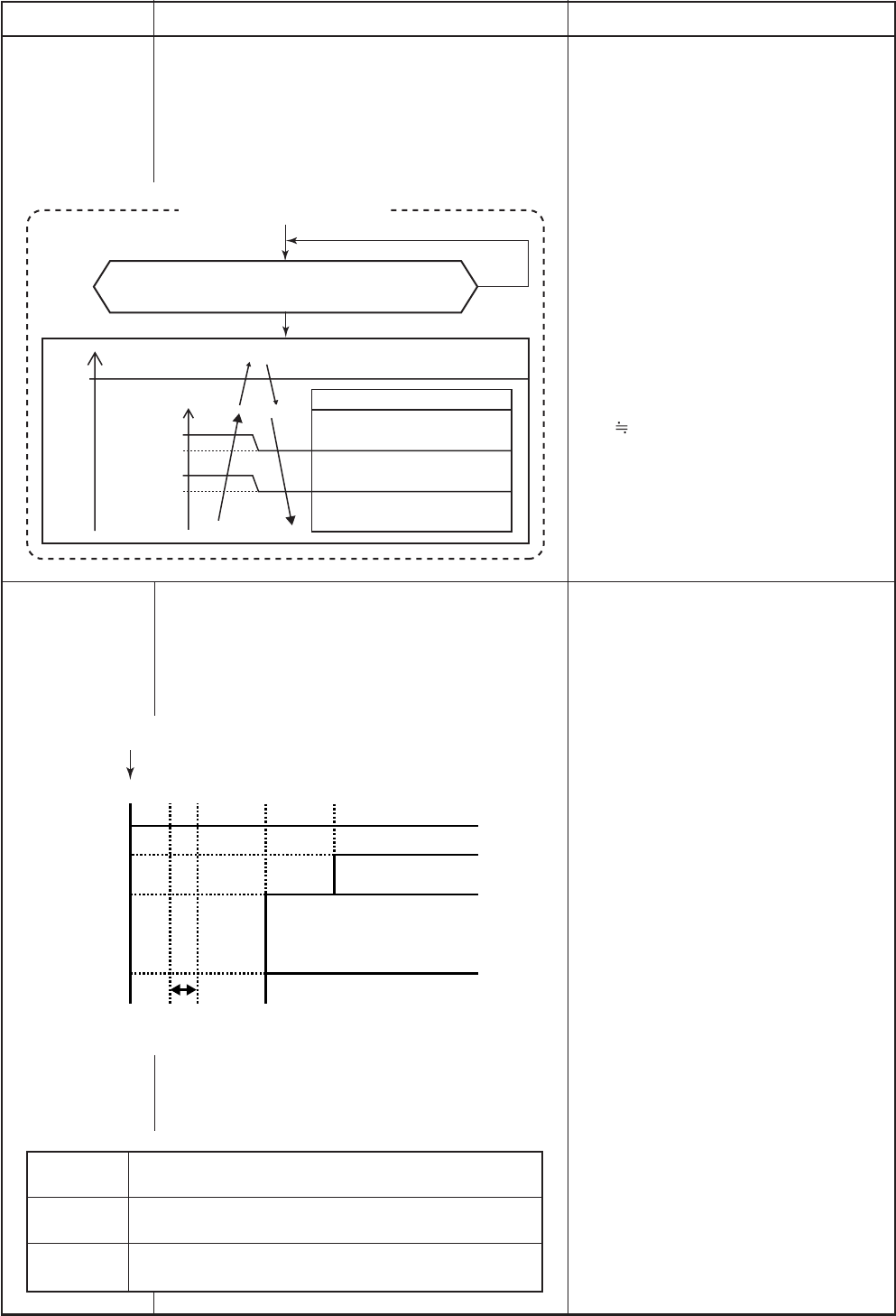
– 36 –
20˚C
0˚C
–1˚C
–6˚C
–7˚C
OFF
Heating output for winding
10W or equivalent
10W or equivalent
Winding is not heated.
Indoor temperature
Outdoor heat exchanger
temperature
The previous operation was heating and
2 hours passed after the operation had stopped.
In case of operation stop
YES
NO
–4˚C
0’ 10’ 15’ 29’ 35’
–6˚C
–25˚C
Operation time
(Minute)
Start of heating operation
Te0 detection time
*
Outdoor heat exchanger temperature
C zone
A zone
B zone
Item
7. Quick heating
control
8. Defrost control
(Only in heating
operation)
Operation flow and applicable data, etc.
This function quickens the starting of heating opera-
tion when indoor/outdoor temperature is low.
(Available only in heating operation)
When indoor temperature is low, this function stores
the heat by heating winding depended on the outdoor
temperature and then it enables the hot air blowing out
quickly.
(This function removes frost adhered to the outdoor
heat exchanger.)
The temperature sensor of the outdoor heat ex-
changer (Te sensor) judges the frosting status of the
outdoor heat exchanger and the defrost operation is
performed with 4-way valve reverse defrost system.
* The minimum value of Te sensor 10 to 15 minutes
after start of operation is stored in memory as Te0.
Table 1
Description
When the following conditions are satis-
fied, winding is heated by output varied by
the outdoor heat exchanger temperature.
Condition 1 :
The previous operation was heating.
Condition 2 :
2 hours passed after operation stop.
Condition 3 :
The room temperature is 20°C or lower.
The indoor temperature sensor detects the
room temperature.
If the detected room temperature is 20°C
or lower, the outdoor heat exchanger
temperature sensor detects the outdoor
heat exchanger temperature. As shown in
the left figure, winding of the compressor
is heated for each division of the tempera-
ture (
for each outdoor temperature) and
the heat is stored.
The necessity of defrost operation is
detected by the outdoor heat exchanger
temperature. The conditions to detect the
necessity of defrost operation differ in A,
B, or C zone each. (Table 1)
<Defrost operation>
• Defrost operation in A to C zones
1) Stop operation of the compressor for 20
seconds.
2) Invert (ON) 4-way valve 10 seconds
after stop of the compressor.
3) The outdoor fan stops at the same time
when the compressor stops.
4) When temperature of the indoor heat
exchanger becomes 38°C or lower,
stop the indoor fan.
<Finish of defrost operation>
• Returning conditions from defrost
operation to heating operation
1) Temperature of outdoor heat exchanger
rises to +8°C or higher.
2) Temperature of outdoor heat exchanger
is kept at +5°C or higher for 80 seconds.
3) Defrost operation continues for
15 minutes.
<Returning from defrost operation>
1) Stop operation of the compressor for
approx. 50 seconds.
2) Invert (OFF) 4-way valve approx. 40
seconds after stop of the compressor.
3) The outdoor fan starts rotating at the
same time when the compressor starts.
A zone
B zone
C zone
When Te0 - TE ≥ 2.5 continued for 2 minutes in A zone,
defrost operation starts.
When the operation continued for 2 minutes in B zone,
defrost operation starts.
When Te0 - TE ≥ 3 continued for 2 minutes in C zone,
defrost operation starts.


















